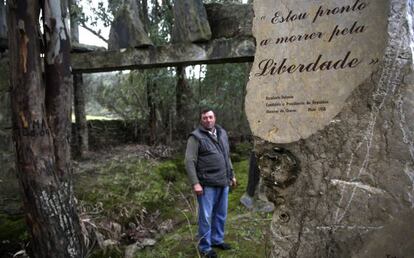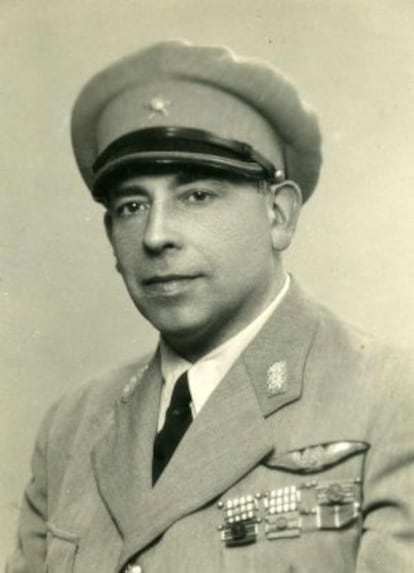Reopening a murdered general’s tomb
A new movie sheds light on the 1965 assassination of Portuguese dissident Humberto Delgado by dictator António de Salazar's secret police in Spain

Felipe Porra, a 62-year-old farmer from Villanueva del Fresno, in Badajoz province, points at a spot on the dry pass over a brook flanked by rows of eucalyptus trees. "My friend and I were walking along there. He was 13, I was 15," he says.
It was a warm morning in April 1965. The teenagers were out looking for nests up in the trees, when Felipe saw something sticking out of the ground. It was a head -- a decomposed, semi-buried, disfigured head torn to shreds by dogs. Felipe casually told his friend: "Look, a dead donkey." His friend took a few steps forward and noticed a second mound of bones and decomposing flesh, and remarked just as indifferently that here was another donkey. Then Felipe came near the second body, took a closer look, and exclaimed: "That's not a donkey! Donkeys don't have gold teeth!"
Felipe and his friend had just discovered the evidence of the most famous political crime in recent Portuguese history: the assassination of Humberto Delgado, an aviation general who was the dictatorship's top enemy, and that of his secretary and lover, a Brazilian woman named Arajaryr Campos (the owner of the gold tooth).
Their discovery had just foiled the stealthy strategy of the PIDE, the secret police at the service of António de Salazar's authoritarian regime. The sinister unit had meant for both bodies to remain forever buried in that remote corner of the Spanish province, an area full of smuggling routes just a step away from the border with Portugal.
That's not a donkey! Donkeys don't have gold teeth!" Felipe exclaimed
The fortuitous find showed the world the modus operandi of Salazar and his silent army of minions, and it also became a diplomatic nightmare for the Portuguese regime, given the bodies had been found in Spain.
A new movie just out in Portugal, Operação Outono (or, Operation Autumn), puts the old story back on the map and questions a few dark points in the legal proceedings against the secret agents involved in the crime following the return to democracy after the 1974 Carnation Revolution.

Directed by Bruno de Almeida, the film is based on a monumental biography of Humberto Delgado, Biografía do general sem medo (Biography of the fearless general), published two years ago by his grandson Frederico Delgado Rosa. The meticulous reconstruction of the trap set by PIDE to get rid of the general shows that the assassination was carried out by a brigade led by a lame chief and comprising, among other members, a hulking giant of a man whose specialty was beating people to death with a stick.
Delgado, who was 59 and living in exile in Algiers, had once been an important member of Salazar's regime, but had become a visible leader of the dissidence movement and the dictator's most irritating opponent. In the mid-1960s, Portugal's secret police found a way to neutralize him. Thanks to a shady figure named Mário de Carvalho, who was based in Rome and gained Delgado's trust before selling out to PIDE, agents were able to lure their victim to Badajoz on the promise of a secret meeting with a group of military men opposed to Salazar's regime.
Delgado showed up at the appointed place with his personal secretary on February 13, 1965. A phony lieutenant picked them up at Badajoz train station (it was in fact deputy police chief Ernesto Lopes Ramos) and drove them to a remote spot where they were supposed to meet with the dissidents. Unwilling to have witnesses along, Lopes Ramos tried to prevent the woman from getting into the car, but Delgado, who still suspected nothing, insisted that she come.
The general only realized he had fallen into a trap when they were already far away from civilization and got a glimpse of Casimiro Monteiro, an enormous man who looked more like a hired thug than a military conspirator.
Among the gang was a man specialized in beating people to death with a stick
According to the version of events offered by Lopes Ramos, and the two other police officers who were charged with the crime under Portuguese democracy, Monteiro -- who later fled to South Africa and was never found -- shot Delgado in the head without permission from anybody, killing him instantly. Later, they said, he did the same with the secretary. The three defendants claimed that they were in shock, that their intention was simply to arrest the general, not kill him. Afterwards, they said they hid the bodies inside two cars, found a hidden spot and quickly buried them where they thought they would never be discovered. The judges in charge of the case after 1974 accepted this story and acquitted everyone except Monteiro.
But the new movie contains revelations that radically transform history and its consequences, and change the people who are ultimately guilty or responsible for what happened.
"Monteiro was the perfect scapegoat: he had fled and was impossible to locate, so he was charged with everything. That way, the others got away scot-free," says Frederico Delgado. "And what's even more important, the regime was saved, Salazar's memory was saved. Nobody gave the order to kill. Let's not forget that the military court that handled the case was pro-Salazar. That is why they did not use the documents provided by the Spanish police, which were essential to the case."
The general's grandson, an anthropologist turned historian (and practically a detective as well), analyzed the autopsies conducted by Spanish forensics at the time and concluded that his grandfather was beaten to death following a scuffle, not shot as claimed.
"Because there was a fight, if the policemen really did not want to kill him, they could have prevented Monteiro from killing my grandfather; if they didn't, it was because they had orders to kill him. Nothing was improvised, and Monteiro did not act on his own following a sudden impulse. That is why they had picks, shovels and lime in the cars, to bury him."
"Everyone got away," adds film director Bruno de Almeida. "That is why the movie is relevant today, I believe, because it deals with corruption, silence and lies."
"We found the bodies because it was a dry year," notes the farmer Felipe Porra. "Had it rained, I think the brook would have washed them away and nobody would have ever known about them."
Tu suscripción se está usando en otro dispositivo
¿Quieres añadir otro usuario a tu suscripción?
Si continúas leyendo en este dispositivo, no se podrá leer en el otro.
FlechaTu suscripción se está usando en otro dispositivo y solo puedes acceder a EL PAÍS desde un dispositivo a la vez.
Si quieres compartir tu cuenta, cambia tu suscripción a la modalidad Premium, así podrás añadir otro usuario. Cada uno accederá con su propia cuenta de email, lo que os permitirá personalizar vuestra experiencia en EL PAÍS.
¿Tienes una suscripción de empresa? Accede aquí para contratar más cuentas.
En el caso de no saber quién está usando tu cuenta, te recomendamos cambiar tu contraseña aquí.
Si decides continuar compartiendo tu cuenta, este mensaje se mostrará en tu dispositivo y en el de la otra persona que está usando tu cuenta de forma indefinida, afectando a tu experiencia de lectura. Puedes consultar aquí los términos y condiciones de la suscripción digital.









































